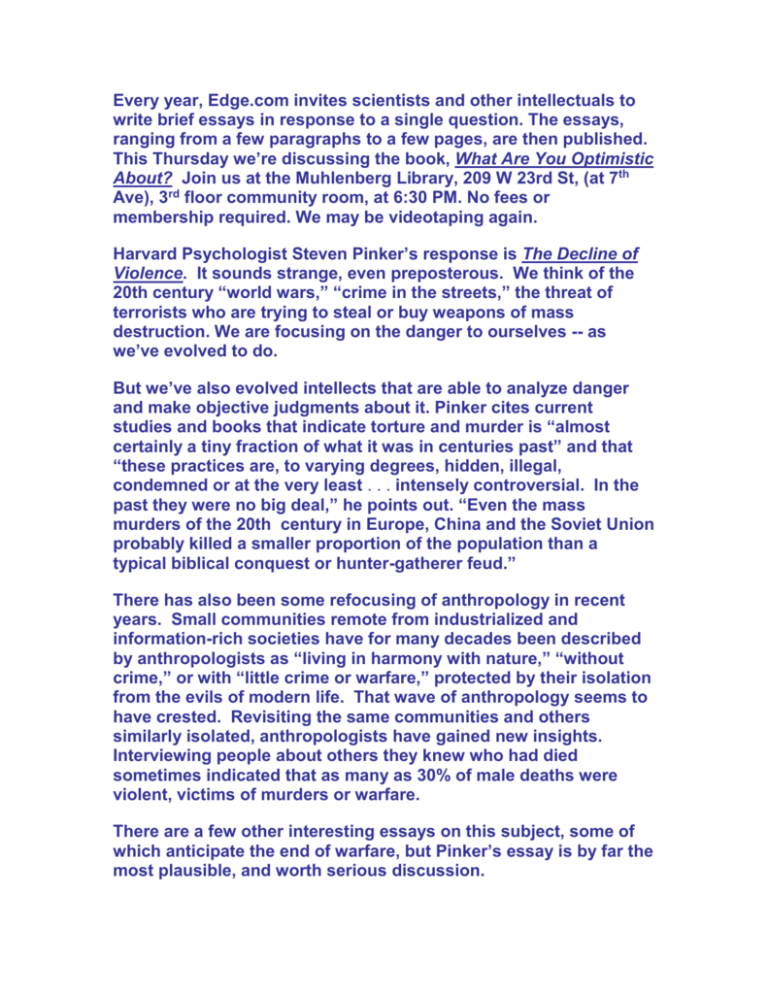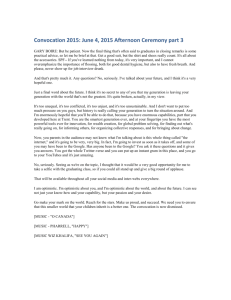Every year, Edge
advertisement

Every year, Edge.com invites scientists and other intellectuals to write brief essays in response to a single question. The essays, ranging from a few paragraphs to a few pages, are then published. This Thursday we’re discussing the book, What Are You Optimistic About? Join us at the Muhlenberg Library, 209 W 23rd St, (at 7th Ave), 3rd floor community room, at 6:30 PM. No fees or membership required. We may be videotaping again. Harvard Psychologist Steven Pinker’s response is The Decline of Violence. It sounds strange, even preposterous. We think of the 20th century “world wars,” “crime in the streets,” the threat of terrorists who are trying to steal or buy weapons of mass destruction. We are focusing on the danger to ourselves -- as we’ve evolved to do. But we’ve also evolved intellects that are able to analyze danger and make objective judgments about it. Pinker cites current studies and books that indicate torture and murder is “almost certainly a tiny fraction of what it was in centuries past” and that “these practices are, to varying degrees, hidden, illegal, condemned or at the very least . . . intensely controversial. In the past they were no big deal,” he points out. “Even the mass murders of the 20th century in Europe, China and the Soviet Union probably killed a smaller proportion of the population than a typical biblical conquest or hunter-gatherer feud.” There has also been some refocusing of anthropology in recent years. Small communities remote from industrialized and information-rich societies have for many decades been described by anthropologists as “living in harmony with nature,” “without crime,” or with “little crime or warfare,” protected by their isolation from the evils of modern life. That wave of anthropology seems to have crested. Revisiting the same communities and others similarly isolated, anthropologists have gained new insights. Interviewing people about others they knew who had died sometimes indicated that as many as 30% of male deaths were violent, victims of murders or warfare. There are a few other interesting essays on this subject, some of which anticipate the end of warfare, but Pinker’s essay is by far the most plausible, and worth serious discussion. Physicists have always been among Edge.com’s most enthusiastic members and since these essays were written in 2007, you will not be surprised that many focused their high beams of optimism on the CERN Large Hadron Collider, which was to start up shortly. In September of 2008, it was started, and a week or so later was shut down for serious problems. It is scheduled to go on line again in September 2009. Some of the physicists who contributed to the book are optimistic about advances in string theory, some are optimistic that string theory will soon cease to dominate the scene, some are optimistic that the world is so full of surprises their own current views will be proven wrong (thereby opening new fascinating horizons). Their brief essays are very accessible, and I highly recommend them – and for those laymen who doubt this, you may go directly to the essay by Jerry Adler, Senior editor, Newsweek, titled, “Sometime in the 21st Century I will Understand 20th-Century Physics.” Several writers have addressed the conflict between religion and science. Philosopher Daniel Dennett sees people naturally gravitating away from religion in each new generation as they have access to knowledge on an increasingly broad scale. “Many religions,” he writes, “have already made the transition, quietly deemphasizing the irrational elements in their heritages, abandoning the xenophobic and sexist prohibitions of their recent past, and turning their attention from doctrinal purity to moral effectiveness.” Scientific American columnist and publisher of Skeptic magazine Michael Shermer writes that irrational religious beliefs exist in America today on a scale similar to beliefs in, say, astrology, but reminds us that it was only a few centuries ago that almost everyone in England believed in witchcraft and prayer (and, come to think of it, astrology). He briefly but clearly portrays the transition of magic into science, a transition toward more orderly, evidence-based beliefs, a transition continuing on indefinitely into the future. Stanford physicist Leonard Susskind indirectly addresses the question of whether societal efforts such as education can have more than a limited effect on human nature. “I am optimistic about the adaptability of the human brain to answer questions that evolution could not have designed it for. A brain that can rewire itself to visualize four dimensions, or the Heisenberg uncertainty principle, is clearly going way beyond what natural selection could have wired into it.” Psychologist Martin E. P. Seligman resorts, as we often do with these issues, to metaphor. He does so in a charming way, titling his essay The First Coming. He agrees with Robert Wright that “the invisible hand of biological and cultural evolution ineluctably selects for the complex over the simple because positive-sum games have the survival and reproductive edge over zero-sum games, and that over epochal time more and more complex systems – fitfully but inevitably – arise.” He thus characterizes our intellectual endeavors toward the qualities we attribute to God: “Omniscience is arguably the ultimate end product of science. Omnipotence is arguably the ultimate end product of technology. Goodness is arguably the ultimate end product of positive institutions.” Our concept of God has those integral characteristics, and if we ever come close to achieving them ourselves, we will have created God. He entices us with the 1950’s Isaac Asimov story titled, ‘The Last Question’. In the year 2061, the universe, including earth, of course, is cooling down and scientists feed a critical question to a computer, “Can entropy be reversed?” The computer responds, “Not enough data for a meaningful response.” In the next scene, Earth’s inhabitants have fled the white dwarf that used to be our sun for younger stars and as the galaxy continues to cool they ask the miniaturized supercomputer, which contains all of human knowledge, “Can entropy be reversed?” It answers, “Not enough data.” This continues through more scenes, with the computer ever more powerful and the cosmos ever colder. The answer, however, remains the same. Trillions of years pass, and all life and warmth in the universe have vanished. All knowledge is compacted into a wisp of matter in the near-absolute zero of hyperspace. The wisp asks itself, “Can entropy be reversed?” “Let there be light,” it responds. And there was light.






